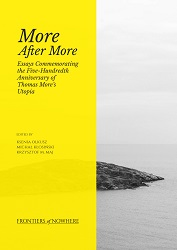
We kindly inform you that, as long as the subject affiliation of our 300.000+ articles is in progress, you might get unsufficient or no results on your third level or second level search. In this case, please broaden your search criteria.



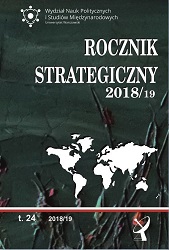

In the last dozen months we have seen a spectacular comeback of power politicsin international relations. It is partially caused by a crisis of democracy and of theinternational liberal order as well as by an increase of unilateralism in the policy ofbig states. At the same time, we note a peculiar pandemic of a petty tyrant type ofpoliticians who are power hungry and ready to change the political system of theircountry in order to extend their rule indefinitely. The trend has been accompanied bya dramatic decrease of moral standards in international politics. The trend of powerpolitics has been dictated by the US administration and enthusiastically followedby Russia and China, which feel in their natural element in it. The same has beennoted in the policy of a number of mid-size powers. The Middle East seems tobe a regional laboratory of this tendency, with the dangerous example of Saudi--Iranian confrontation. The new global political context means the risk of furthermarginalization of the European Union. Additionally, internal problems made theUnion even weaker. Macron’s and Merkel’s position has been put into question andturbulent Brexit damaged the energy and image of both the UK and the Community.Poland’s policy, marked by the rise of centrifugal nationalistic political forces, looksmore like part of the problem than the solution of the troubling European situation.
More...
The article presents the activities of the UN Security Council in 2018 in lightof the Secretary General’s statements concerning the state of the world. The firstpart is devoted to drafts of resolutions on the Middle East, which were vetoed bypermanent members of the Security Council. The second one is focused on decisionsconcerning African states such as the Republic of Central Africa, Sudan, SouthSudan, Democratic Republic of Congo, Mali, and Somalia; as well as on thematicresolutions concerning peacebuilding, protection of civilians and children in armedconflicts, the role of youths for peace and security. In the third part, basic data on peacekeeping are presented and some violations of peacekeeping rules described.A separate part is devoted to Poland’s activities within the SC and in particular itsengagement in promoting international law.
More...
In 2018, the world’s arms control architecture teetered on the brink of collapse.The paper presents some examples of this process: 1. the United States withdrewfrom the Iran nuclear deal (P5 + 1 – Iran); 2. the summit in Singapore was important,but negotiations between the United States and North Korea over Pyongyang’snuclear programme and denuclearization of the Korean Peninsula stalled; 3. the newSTART was correctly implemented but its future is uncertain; 4. the US threatenedto withdraw from the INF.
More...
The aim of the article is to present the major armed conflicts – the wars in threeMiddle East countries: Syria, Iraq, and Afghanistan. The selection criteria includenot only geographic factors, but also the nature of the conflicts, i.e. they are allcivil wars and have become internationalized as a result of involvement of externalpowers, i.e. the military forces of several countries. In Syria, Iraq, and Afghanistan the enemy has been the so called Islamic State; in Syria it was the main enemy. Thethree countries were the most impacted by terrorism.
More...
The paper presents an overview of the changes in the global economy since 2017.Consecutive sections deal with the analysis of economic indicators and challengesfaced by Global Economic Governance in its particular dimensions: trade, finance,and development. In spite of a moderately positive condition of the global economyin the last two years, the current situation cannot be considered as fully stable. Thisapplies both to economic output and the future of the global economic order. Inevery dimension of Global Economic Governance, there is a significant rift betweenthe efforts to promote multilateral solutions and individual actions taken by somestates. In case of the global trade system, the major concern constitute the risingprotectionism and the threat of trade conflicts, as well as the growing dysfunctionof the World Trade Organization (WTO). The recurring issue for global financialsystem remains its reform. In terms of global development cooperation, progresshas been made towards eliminating poverty, yet simultaneously income inequalitiesare on the rise. Moreover, in spite of the ongoing reform of development finance,the current system is incapable of meeting the needs of sustainable development andinclusive growth.
More...
2018 was a year of substantial internal reconfigurations in the EU. In the article,the author focuses on three processes with the biggest potential for change. There isgrowing awareness of practical difficulties of leaving the EU in an orderly fashion,especially in light of the severe political crisis in Great Britain. Chancellor AngelaMerkel declared her plan to leave (in an orderly way) and the opinion polls beforethe European Parliament elections suggest there is a possibility of a relative successof Eurosceptic parties, which would result in anything but order. The power gamewithin the EU starts with the May 2019 elections and it will take up a better part ofthe year. The consequences of 2018 political decisions are still unknown – growinguncertainty being the only certain factor.
More...
The aim of this article is to analyze international relations in the Asia-Pacific regionfrom the historical perspective of the 40th anniversary of the economic reformin China and the establishment of diplomatic US-China relations. China’s successfulreform programme and US-China economic cooperation have helped to transformthis country into a superpower and, as a result, multilateralism in the region hasbeen replaced by new US-China bipolar structure. 2018 was the year regional actorsgrew accustomed to this new strategic environment.
More...
After the end of the Cold War, the international order began its transition, bothon a global and a European scale. As a consequence of these changes and underthe influence of a series of crises in the EU, two opposing tendencies have beenstrengthened. On the one hand, intensified questioning of the current directions ofintegration, and on the other, the desire to reinforce the management in the EU bythe European core, represented primarily by France and Germany. The aim of thearticle is to show power politics in the EU on the example of internal market changeshappening at a time of transition of the international order.
More...
The aim of the article is to analyze the evolution of India’s strategy in the Asia-Pacific region after 2014, i.e. after the Indian People’s Party (Bharatiya Janata Party,BJP) came to power and the post of prime minister was taken over by NarendraModi. The article characterizes and discusses the main assumptions, directions, andinstruments of India’s foreign policy in the Asia-Pacific region.The article attempts to answer two main research questions: whether and, if so,why has India adopted a more active strategy in the Asia-Pacific region; and whether,in its strategy in the political-strategic and security sphere, it has opted for an alliancewith the USA in the Asia-Pacific region.Answers to these questions will allow us to verify hypothesis stating that,especially under the influence of the dynamics of intra-regional relations in foreignpolicy in 2010s, India has redefined its role and position on the Asian continent andhas strived to implement a balancing policy in order to limit China’s increasinglyimportant role and to prevent the shift of power on the Asian continent in favour ofBeijing. To achieve its goals, India advocates a political and strategic alliance withthe USA and its allies as one of the pillars of a democratic, liberal order in the Indo--Pacific region (as an alternative to the order proposed by China).The theoretical tool used in this case study of India’s regional strategy is thecategory of balancing policy. This research tool was selected for its cognitiveand explanatory values which emphasize the importance of the anarchism of theinternational system and the fact that the rules of relations between states area function of the balance of power between them.
More...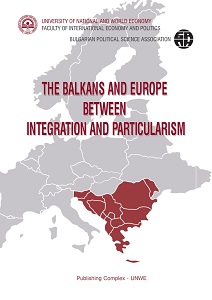
Please let me extend my gratitude to the Faculty of International Economy and Politics of the University of National and World Economy and to the Bulgarian Association of Political Science for the invitation and the opportunity to exchange withyou on the important topic of the European perspective and connectivity of the Western Balkans as a specific priority of the first Bulgarian Presidency of the Council 2018.
More...
As in previous times, nowadays processes in Southeastern Europe (the Balkans)have been swirled into the maelstroms of world geopolitical clashes. Following theunprecedented "new world order", initiated by the superpower that has prevailed atthe end of Cold War era, the main features of the current international system havebeen molded within the clashes among new centers of power, declaring ambitions tobe paramount factors in a dynamically changing world.
More...
Today’s challenges of the Balkan countries are largely a result of the fact that the national model of statehood is very difficult to operate in a region where the Ottoman Empire existed for many years. This left a strong footprint on the culture and traditions of the population. All these formed the contemporary political culture of the Balkan countries. Thus, the present research focuses on the Balkan states’ political culture. It aims at making a general description ofthe political culture of the Balkans, identifying the common features of the countries, using historical approach and comparative analyses.. Also a comparison is made with the political culture of "full democracies". The analysis covers indicators and builds on data from the European ValuesStudy, 4th wave. The results show that the countries indeed have common characteristics but stillthere are variations. Although the Balkan countries are close to full democracies on some of theindicators, on others – significant differences are observed.
More...
This study was prompted by the strong academic and research interest in President Donald Trump’s governance and rhetorical style, which is atypical of any senior government official holding a high post in the state administration. Another major motivation for selecting thisresearch object is the topicality of political discourse, and its linguistic and pragmatic aspects, inthe era of post-truth politics. Yet another reason was the typically negative image of the Balkans ina historical perspective. The findings in this study largely confirm those established in previousresearch with regard to Donald Trump’s foreign policy priorities. Even though Trump is differentin form – in language and rhetoric – in his foreign policy, he shows continuity with his post-ColdWar predecessors in substance, especially in the Balkans and South-eastern Europe.
More...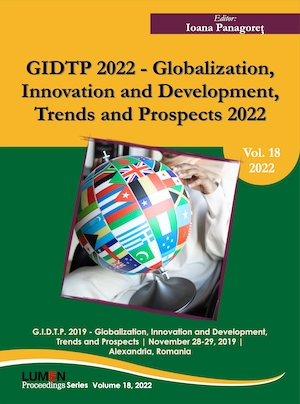
The European Commission (EC) and Romania ensure a shared management of European funds and the principles governing the current financial framework are those of sound financial management. For each operational program, European regulations make mandatory the existence of the following authorities: the management body (MA), the certifying body (CA) and the audit institution (AA), which must operate independently of each other. Each Member State has the freedom to create its own institutional framework, if the three authorities mentioned in the European regulations are clearly defined and delineated.The present article aims to present whether the management and control system (MCS) implemented at the Romanian level is too bureaucratic if too many authorities have been created on the European Commission's cash flow. At the same time, some of the main causes will be identified, which may lead to a lack of beneficiaries' interest in accessing the funds allocated to certain programs. Some of these cases originate from the 2007-2013 programming period where Romania was sanctioned by the European Commission with many financial corrections due to systemic irregularities identified in the process of public procurement procedure, the evaluation and selection process projects. At the same time, the lack of funding due to the failure to complete some projects in time in December 2015 will be considered, as it is compulsory to ensure the necessary public and private financial resources from the own local budgets or from the state budget in order to be able to be finished.
More...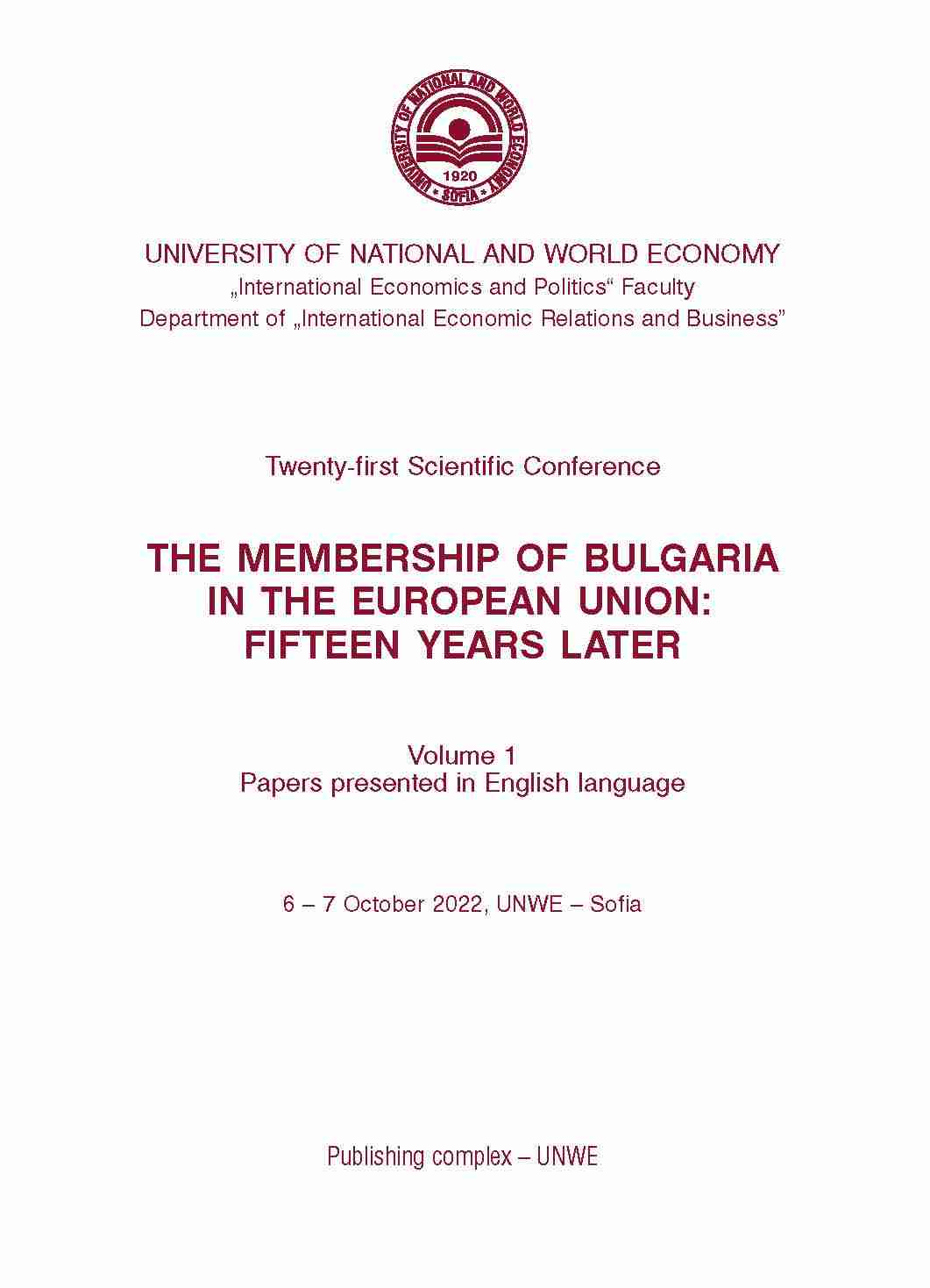
The development of a country (economic and social) is one of the key issues in modern society. For this reason, it is an object of increased research interest - with different research goals and objectives, as well as with a different methodology used for this research. One of the categories often used in modern economic life is competitiveness. It is the focus of the present study, which has as its main objective the analysis, assessment and comparison of the competitiveness with which the Bulgarian economy functions in the context of its membership in the European Union.
More...
The report analyzes the structure and convergent processes of employment in the Bulgarian and Romanian economies for the period 2000-2020, and examines the dynamics of relative shares and rates of change for the respective period. In order to quantitatively measure the degree of convergence/divergence, a divergence index and a difference index were calculated, comparisons with other EU countries with similar characteristics were used, and some possible explanations and consequences of the structural changes that took place were also derived. Overall, the results show a slow process of convergence of the sectoral structure of employment of the Bulgarian and Romanian economies with that of the Eurozone, which continues throughout the period, regardless of some specifics before and after the global recession.
More...